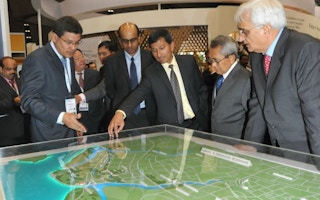Singapore has pumped fresh money into local water research to keep its edge as the leader in water technologies.
Deputy Prime Minister Tharman Shanmugaratnam on Monday announced that the National Research Foundation (NRF) will allocate another $140 million to promote research and development (R&D) in the water sector and to convert these ideas into practical water solutions.
Such investments are “imperative”, he said, “even if this means taking a long-term view, as the gestation periods can be long before the pay-offs to new technologies are realised”.
Speaking at the opening ceremony of the Singapore International Water Week, Mr Tharman shared with a 1,800-strong audience that the journey towards water security “will always be a ‘work-in-progress’ for Singapore, as new challenges emerge in the urban environment”.
These challenges are not unique to Singapore, he added, as cities around the world “will have to contend with issues such as weather extremities in the context of urbanisation, increasing water demand and higher public expectations”.
His comments come as Singapore has been experiencing flash floods across the island recently, which have caused traffic snarls and damage to properties worth millions of dollars. A panel of experts has since been set up to review Singapore’s drainage system and flood-prevention measures.
The new funds announced yesterday brings the total R&D budget for the water sector to $470 million. In 2006, when the NRF was set up with a five-year $5 billion budget, it had set aside $330 million for water research.
Last year, the NRF received a $16.1 billion top up for research, innovation and enterprise under the Singapore Government’s recently heightened R&D push.
With these fresh investments, Mr Tharman said Singapore is hopeful that it will hit its goal of growing the economic contribution from the water sector from $500 million in 2003 to $1.7 billion by 2015. It also hopes for a doubling of jobs to 11,000 in the industry by then.
The NRF will allocate the funds to the Environment and Water Industry programme office, which was set up to convert research ideas into commercial water solutions.
Mr Tharman noted that under the NRF’s initiatives, some water projects funded include research into advanced membrane processes, bio-mimicry (technologies that mimic nature) and low-energy seawater deslination.
Mr Tharman told industry leaders at the four-day conference that collectively, the water community can surmount present challenges by improving on three areas.
The first is investment in technology and R&D. Secondly, cities can look at the challenges as opportunities to rejuvenate urban living, he said. He cited the Delta Programme in the Netherlands which acquires land for the temporary storage of excess river water. This doubles as parkland for recreational activities for most of the time when it is dry.
Singapore’s Active, Beautiful, Clean or ABC Waters programme – driven by national water agency PUB – is a similar initiative which transforms “utilitarian drains and canals into beautiful and vibrant rivers and streams,” he said.
Thirdly, the industry needs closer collaboration between the public sector, academic and private firms, he said. One example is the Singapore-Delft Water Alliance set up in 2007 by the National University of Singapore, consultancy firm Deltares and PUB, which aims to develop solutions for the urban water cycle.
To date, there are 23 water research centres in Singapore set up by top industry firms such as Siemens and GE Water, he noted.
“By working across boundaries… we can potentially fast-track the development of solutions at a lower total cost, and make the challenge less daunting for everyone,” he said.
Earlier in the day, Environment Minister Vivian Balakrishnan told the Southeast Asia Water Ministers Forum that issues of water management have become increasingly important across Southeast Asia as it is particularly vulnerable to extreme weather events, due to their extensive and heavily populated coastlines.
“(The) forum is a stepping stone towards greater commitment in resolving some of these issues,” he said.
The theme for this year’s water week is “Sustainable Water Solutions for a Changing Urban Environment”. It is expecting thousands of delegates from across the globe to convene in Singapore to discuss water-related issues.

















